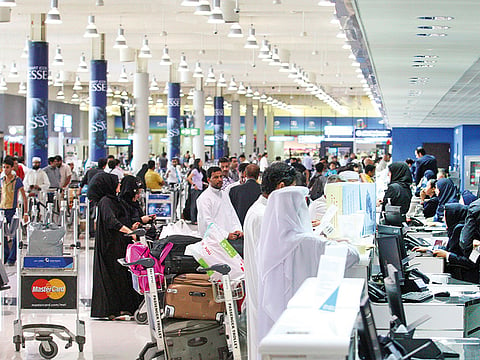IATA: Airport charges a key concern for region’s aviation
Airlines in Middle East, Africa to continue facing challenges in 2017

Abu Dhabi: Airlines in the Middle East and Africa in 2017 are expected to continue facing much of the same challenges they did in 2016, including political instability, softening demand, currency fluctuations, and lower oil prices.
According to the International Air Transport Association (IATA), a trade group of the world’s airlines, a key concern for airlines in the Middle East region specifically is taxes and charges imposed by operators on airlines and passengers.
“We have a lot of examples in 2015 and 2016 where decisions were made, charges were just put and increased, and airlines were impacted overnight with no consultations. This is a major concern in the area.
“By avoiding that consultation process, it’s causing a lot of headache and a lot of negative financial impact on airlines, which are then reconsidering their frequencies to certain airports, reconsidering the type of planes they’re flying, and when the cost of your tickets go up, you’ll reconsider travelling,” said Mohammad Al Bakri, regional vice-president for Africa and the Middle East at IATA.
In March 2016, Dubai announced that passengers flying out of the emirate’s airports will be required to pay a Dh35 fee for using the airport’s facilities, with the fee being added to airfares. Abu Dhabi announced a similar measure less than three months later.
But it’s not just Dubai and Abu Dhabi. Between 2015 and 2016, there were $1.3 billion added in extra charges across the Middle East’s airports, IATA’s data showed.
In an interview with Gulf News on the sidelines of the World Cargo Symposium, IATA’s Al Bakri said he was concerned that implementation of new charges across the Middle East would hurt aviation on the longer run.
“We have to be realistic; a lot of these government bodies are under a lot of pressure because of the economic situation. However, their role as a main player in the aviation sector is to look at the long range — not only on the short range where they can increase charges and make more revenues. On the long run, they would really be hurting their own industry,” he said.
Air congestion
Another key concern that IATA sees for the region’s aviation industry is air traffic congestion.
“Air space management in the area is a concern to IATA. We continue to work with all parties and all states, and we encourage collaboration and investment in better technology to overcome the space congestion and have a better way of managing it. If you look at the GCC, it’s so clustered together, and the volume and traffic in the GCC is so high … and it really calls for much more investment in air space technologies,” Al Bakri said.
In 2016, airlines in the region reported $900 million in profits, IATA’s data showed, marking a drop from the $1.1 billion recorded in 2015. And IATA expects 2017 to see a further decline in profitability.
On Tuesday, IATA’s director general and chief executive officer, Alexandre de Juniac, said the Association was “heavily concerned” about protectionist rhetoric gaining momentum across the world as it would hurt the aviation sector.
Such policies would not just hurt airlines in the US and Europe, but across the Middle East and Africa.
However, such macro challenges also provide opportunities for the Middle East’s airlines.
“There are lots of opportunities, really. When people are forced to evaluate their situation, they will be in a situation to take a deeper look into the fundamentals of their business model, and take a deeper look into internal efficiencies, and how they can … better utilise their products, their aircraft, their capacity,” Al Bakri said.
Sign up for the Daily Briefing
Get the latest news and updates straight to your inbox



